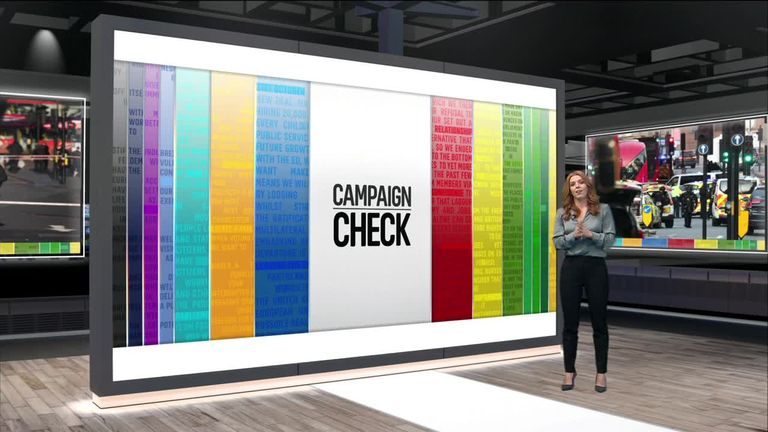Campaign Check: How true are politicians' claims over London Bridge attack?
Home Secretary Priti Patel has attacked Labour over the early release of London Bridge attacker Usman Khan.
Monday 2 December 2019 21:10, UK
Despite pleas from the families of the London Bridge attack victims not to politicise their personal tragedy, the politicians have effectively done just that.
While campaigning for the upcoming general election was briefly suspended in the wake of Friday's attack, it seemed inevitable that at some point, mourning the two Cambridge University graduates who lost their lives would turn to political point-scoring.
Perhaps, though, we did not expect it to happen so soon.
The identities of the two victims - Jack Merritt and Saskia Jones - had not yet been made public when the finger pointing began.
In a tweet, Home Secretary Priti Patel attacked Labour, claiming legislation introduced in 2008 meant that dangerous terrorists had to be automatically released after half their term, before the Conservatives changed the law in 2012.
So is that the case?
In order to assess the truth of that assertion, minds need to be cast back to 2005, when the Labour government introduced Detention for Public Protection, or DPPs.
These were indeterminate sentences for offenders aged between 18 and 21 who represented a danger to the public.
The judge would set a minimum jail term, after which a prisoner would be assessed by a parole board before release.
Labour also introduced Extended Sentences for Public Protection, or EPPs, meaning prisoners were given a longer, determinate sentence and made eligible for release at the halfway point, depending on a parole board hearing.
By 2008, in response to a surging prison population, the Labour government changed the law to allow the automatic release of prisoners - with no input from the parole board.
Two years later, the political landscape had changed with Labour out of power and the Tories and Liberal Democrats forming a coalition government.
With the picture changing in Westminster in February 2012, a 20-year-old Usman Khan pleaded guilty to being part of a group of extremists - some of whom were plotting to attack the London Stock Exchange.
He was given a DPP and jailed for a minimum of eight years.
But just over a year later, Khan successfully appealed that decision and was given an EPP.
He was handed what might have seemed like a longer 16-year sentence.
But crucially, he was now eligible for automatic release without a parole board hearing.
That very thing happened in December last year when Khan was released after serving eight years, although he remained subject to conditions, including wearing an electronic tag.
He would also have had to have told police of his intention to travel to London for the prisoner rehabilitation conference where he began his attack.
:: Listen to the Daily podcast on , , ,
It's worth pointing out that the Tory-Lib Dem government changed the law in December 2012, just after Khan was first convicted.
It meant that offenders like him would now always be subject to a parole board hearing before release.
But the law was not applied retrospectively, so did not apply to Khan.
If it had applied to him, he may have remained in prison.
The conclusion has to be that both parties and a period of austerity contributed to a sentencing system that allowed Khan to be released while, in hindsight, he clearly still posed a danger to the public.
There were laws available in 2012 to keep Khan imprisoned but the Court of Appeal judge, Lord Justice Leveson, deemed that unnecessary.
It's why Priti Patel is incorrect to lay the blame solely at Labour's door.
The Brexit Election on Sky News - the fastest results and in-depth analysis on mobile, TV and radio.
- Watch Dermot Murnaghan live from 9pm on 12 December
- See the exit poll at 10pm
- Watch KayBurley@Breakfast election special on 13 December
- Find out what happens next in All Out Politics special from 9am with Adam Boulton






